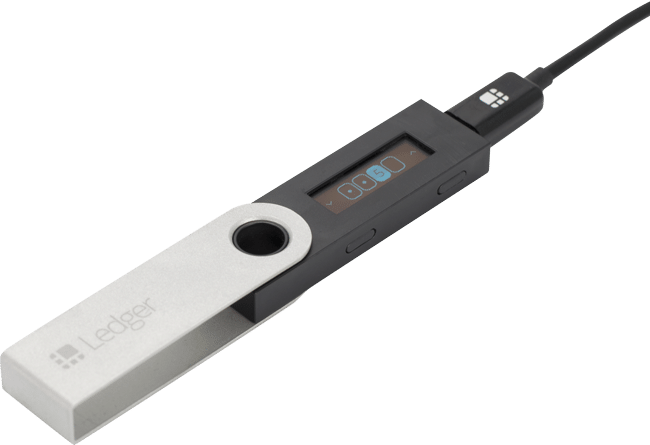- Court of Public Opinion
- User Interface
- Security
- Accessibility/ Convenience
- Final Thoughts/ Recommendations
The Ledger Nano S is a Bitcoin, Ethereum, and altcoin hardware wallet consisting of robust security features, which can be used for both storing digital assets and making payments. Some of the distinguishing features associated with this hardware wallet include ease of use, the ability to quickly make payments, a high level of security, and more.
The Ledger Wallet company was founded in 2014 in France, and since then, Ledger has become one of the biggest hardware wallet providers in the industry.
Ledger’s competition includes hardware wallets such as TREZOR.
In this Ledger Nano S review, we’ll go over a few different aspects such as usability, security, and convenience.
Court of Public Opinion
It seems like most of the users submitting reviews are beyond satisfied with the Ledger Nano S.
Numerous users have called it a great method of “sleeping well at night”, especially since hardware wallets are generally used by those who have a higher number of coins. The public also believes that the device works smoothly, and most have no major complaints about it.
However, the wallet may not be the best choice for those who hold multiple digital currencies and actively use most of them. This is due to the low storage space available on the device.
When storing and using a digital currency in the wallet, users have to download a specific app for that token. Currently, the hardware only has enough storage space for two or three of these apps. This means that if you wish to use a different currency, you’ll have to uninstall an app and install another.
This process is pretty straightforward especially if you’re near a computer. However, it can become a nuisance for those who make payments using different digital currencies constantly.
User Interface
The user interface of the Ledger Nano S has been designed with a fluid user experience in mind.
Using the wallet is similar to the usage of most other hardware wallets on the market, and the process is fairly straightforward. When the hardware wallet is set up for the first time, users will have to select a pin. Later on, a 24-word seed will be given which can be used for the creation of private keys.
The initial setup takes about three minutes, with most of the time being spent on having to write down your seed to keep it in a safe place. Once the device has been set up, users will have to install the apps required to use the device depending on the digital currency of choice. These apps are used to either send or receive currency- they have no purpose in helping the wallet store your coins.
A Chrome extension is available as well, and it makes things even easier. Its main functionalities are accessing account details, sending Bitcoin via the hardware wallet, generating Bitcoin addresses to receive funds, as well as various settings for the app including the exchange rate and language of use.
A great feature is that the Ledger Nano S also works with existing Bitcoin wallets. Users aren’t required to set up an additional wallet to store the coins. Some of the supported online wallets include, but are not limited to Electrum, MyCelium, Copay, MyEtherWallet, and Bitgo.
At this time, the Ledger Nano S supports the following digital currencies: Bitcoin, Ethereum, LiteCoin, Zcash, Dash, and Stratis. The device supports sending payments, receiving payments, checking account details, as well as managing multiple addresses.
The Ledger Nano S is generally easy to understand if you understand how digital currencies work and the basics behind transactions, and even if you don’t, it’s pretty easy to pick up. The hardware wallet is also controlled via two buttons, so the margin for user error is fairly small.
Security
Hardware wallets represent by far the most secure way of storing digital currencies.
While hardware wallets come with some security flaws as well, most of them are user-based, rather than the fault of the company providing the wallet.
If you do choose to use the Ledger Nano S (or any other wallet, for that matter) you need to take special precautions such as noting down your security seed on paper, rather than on a computer, or avoiding using the wallet on PCs that could potentially be infected.
Theoretically, the Ledger Nano S wallet has no known security vulnerability. It’s a hardware wallet, and when it isn’t connected to a computer, it is close to impossible to hack.
Accessibility/ Convenience
Accessing your coins on the Ledger Nano S requires the use of a computer. The wallet needs to be plugged in with a USB. While this isn’t really much of an inconvenience if you’re at home and have the time, accessing your coins on the go can be a bit difficult.

So, if you want to get on the “I pay for my coffee with BTC” level, your best bet would be to use an online digital currency wallet on your mobile phone.
Compared to other hardware wallets, the Ledger Nano S is simple to use. Your coins can be easily accessed, but having to uninstall and install multiple apps for different tokens can get tedious.
Final Thoughts/ Recommendations
The Ledger Nano S hardware wallet is bound to satisfy the needs of most digital currency enthusiasts. It offers an easy-to-use interface, nice coin accessibility, and great security features.
Ultimately, the Ledger Nano S is a leader in the market for a reason: it produces a product users trust while protecting their tokens and gets the job done effectively.
[wp-review id=”3972″]
Never Miss Another Opportunity! Get hand selected news & info from our Crypto Experts so you can make educated, informed decisions that directly affect your crypto profits. Subscribe to CoinCentral free newsletter now.











